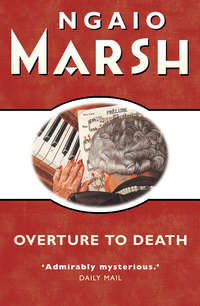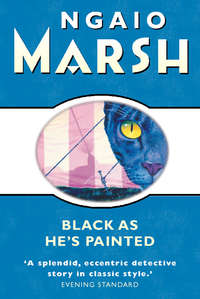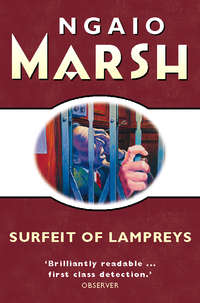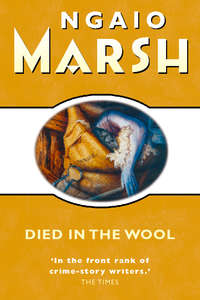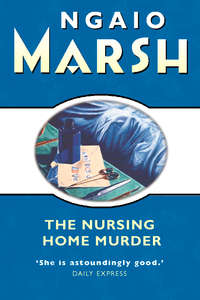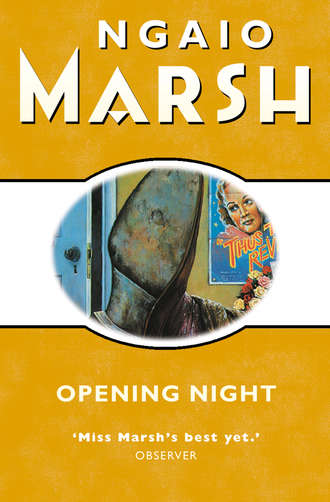
Полная версия
Opening Night
‘With any luck,’ Martyn thought folding back the garments in her case, ‘I won’t have to sell these now.’
She found the tin and gave it to him. ‘Coo!’ he said, ‘looks lovely, don’t it? Tongue and veal and a pitcher of sheep to show there’s no deception. Very tempting.’
‘Can you open it?’
‘Can I open it? Oh, dear.’
She drank her scalding tea and watched him open the tin and turn its contents out on a more than dubious plate. Using his clasp knife he perched chunks of meat on a slab of bread and held it out to her. ‘You’re in luck,’ he said. ‘Eat it slow.’
She urged him to join her but he said he would set his share aside for later. They could both, he suggested, take another cut at it tomorrow. He examined the tin with interest while Martyn consumed her portion. She had never before given such intense concentration to a physical act. She would never have believed that eating could bring so fierce a satisfaction.
‘Comes from Australia, don’t it?’ her companion said, still contemplating the tin.
‘New Zealand.’
‘Same thing.’
Martyn said: ‘Not really. There’s quite a big sea in between.’
‘Do you come from there?’
‘Where?’
‘Australia.’
‘No. I’m a New Zealander.’
‘Same thing.’
She looked up and found him grinning at her. He made the gesture of wiping the smile off his face. ‘Oh, dear,’ he said.
Martyn finished her tea and stood up. ‘I must start my job,’ she said.
‘Feel better?’
‘Much, much better.’
‘Would it be quite a spell since you ate anything?’
‘Yesterday.’
‘I never fancy drinking on an empty stomach, myself.’
Her face burnt against the palms of her hands. ‘But I don’t … I mean, I know. I mean I was a bit faint and somebody … a girl … she was terribly kind …’
‘Does your mother know you’re aht?’ he asked ironically and took a key from a collection hung on nails behind the door. ‘If you must work,’ he said.
‘Please.’
‘Personally escorted tour abaht to commence. Follow in single file and don’t talk to the guide. I thank you.’
She followed him to the stage and round the back of the set. He warned her of obstructions by bobbing his torchlight on them and, when she stumbled against a muffled table, took her hand. She was disquieted by the grip of his fingers, calloused, and wooden, and by the warmth of his palm which was unexpectedly soft. She was oppressed with renewed loneliness and fear.
‘End of the penny section,’ he said, releasing her. He unlocked a door, reached inside and switched on a light.
‘They call this the greenroom,’ he said. ‘That’s what it was in the old days. It’s been done up. Guvnor’s idea.’
It was a room without a window, newly painted in green. There were a number of armchairs in brown leather, a round table littered with magazines, a set of well-stocked bookshelves and a gas-fire. Groups of framed Pollock’s prints decorated the walls: ‘Mr Dale as Claude Amboine’, ‘Mr T. Hicks as Richard I’, ‘Mr S. French as Harlequin’. This last enchanted Martyn because the diamonds of Mr French’s costume had been filled in with actual red and green sequins and he glittered in his frame.
Above the fireplace hung a largish sketch – it was little more than that – of a man of about thirty-five in medieval dress, with a hood that he was in the act of pushing away from his face. The face was arresting. It had great purity of form being wide across the eyes and heart shaped. The mouth, in particular, was of a most subtle character, perfectly masculine but drawn with extreme delicacy. It was well done: it had both strength and refinement yet it was not these qualities that disturbed Martyn. Reflected in the glass that covered the picture she saw her own face lying ghost-wise across the other; their forms intermingled like those in a twice-exposed photograph. It seemed to Martyn that her companion must be looking over her shoulder at this double image and she moved away from him and nearer to the picture. The reflection disappeared. Something was written faintly in one corner of the sketch. She drew closer and saw that it was a single word: ‘Everyman’.
‘Spitting image of him, ain’t it?’ said the doorkeeper behind her.
‘I don’t know,’ she said quickly; ‘is it?’
‘Is it! Don’t you know the guvnor when you see ’im?’
‘The governor?’
‘Streuth, you’re a caution and no error. Don’t you know who owns this show? That’s the great Mr Adam Poole, that is.’
‘Oh,’ she murmured after a pause and added uneasily, ‘I’ve seen him in the pictures, of course.’
‘Go on!’ he jeered. ‘Where would that be? Australia? Fancy!’
He had been very kind to her but she found his remorseless vein of irony exasperating. It would have been easier and less tedious to have let it go but she found herself embarked on an explanation. Of course she knew all about Mr Adam Poole, she said. She had seen his photograph in the foyer. All his pictures had been shown in New Zealand. She knew he was the most distinguished of the younger contemporary actor-managers. She was merely startled by the painting, because … But it was impossible to explain why the face in the painting disturbed her and the unfinished phrase trailed away into an embarrassed silence.
Her companion listened to this rigmarole with an equivocal grin and when she gave it up merely remarked: ‘Don’t apologize. It’s the same with all the ladies: ’E fair rocks ’em. Talk about ’aving what it takes.’
‘I don’t mean that at all,’ she shouted angrily.
‘You should see ’em clawing at each other to get at ’im rahnd the stage-door, first nights. Something savage! Females of the speeches? Disgrace to their sexes more like. There’s an ironing-board etceterer in the wardrobe-room farther along. You can plug in when you’re ready. ‘Er Royal ’Ighness is over the way.’
He went out, opened a further door, switched on a light and called to her to join him.
III
As soon as she crossed the threshold of the star dressing-room she smelt greasepaint. The dressing-shelf was bare, the room untenanted, but the smell of cosmetics mingled with the faint reek of gas. There were isolated dabs of colour on the shelves and the looking-glass; the lamp-bulbs were smeared with cream and red where sticks of greasepaint had been warmed at them and on a shelf above the wash-basin somebody had left a miniature frying-pan of congealed mascara in which a hair-pin was embedded.
It was a largish room, windowless and dank, with an air of submerged grandeur about it. The full-length cheval-glass swung from a gilt frame. There was an Empire couch, an armchair and an ornate stool before the dressing-shelf. The floor was carpeted in red with a florid pattern that use had in part obliterated. A number of dress-boxes bearing the legend ‘Costumes by Pierrot et Cie’ were stacked in the middle of the room and there were two suitcases on the shelf. A gas-heater stood against one wall and there was a caged jet above the wash-basin.
‘Here we are,’ said the doorkeeper. ‘All yer own.’
She turned to thank him and encountered a speculative stare. ‘Cosy,’ he said, ‘ain’t it?’ and moved nearer. ‘Nice little hidey-hole, ain’t it?’
‘You’ve been very kind,’ Martyn said. ‘I’ll manage splendidly now. Thank you very much indeed.’
‘Don’t mention it. Any time.’ His hand reached out clumsily to her. ‘Been aht in the rain,’ he said thickly. ‘Naughty girl.’
‘I’ll soon dry off. I’m quite all right.’
She moved behind the pile of dress-boxes and fumbled with the string on the top one. There was a hissing noise. She heard him strike a match and a moment later was horribly jolted by an explosion from the gas-heater. It forced an involuntary cry from her.
‘’Allo, ’allo!’ her companion said. ‘Ain’t superstitious, are we?’
‘Superstitious?’
He made an inexplicable gesture towards the gas-fire. ‘You know,’ he said, grinning horridly at her.
‘I’m afraid I don’t understand.’
‘Don’t tell me you never ’eard abaht the great Jupiter case! Don’t they learn you nothing in them anti-podes?’
The heater reddened and purred.
‘Come to think of it,’ he said, ‘it’d be before your time. I wasn’t here myself when it occurred, a-course, but them that was don’t give you a chance to forget it. Not that they mention it direct-like but it don’t get forgotten.’
‘What was it?’ Martyn asked against her will.
‘Sure yer not superstitious?’
‘No, I’m not.’
‘You ain’t been long in this business, then. Nor more am I. Shake ’ands.’ He extended his hand so pointedly that she was obliged to put her own in it and had some difficulty in releasing herself.
‘It must be five years ago,’ he said, ‘all of that. A bloke in number four dressing-room did another bloke in, very cunning, by blowing dahn the tube of ’is own gas-fire. Like if I went nex’ door and blew dahn the tube, this fire’d go aht. And if you was dead drunk like you might of been if this girl friend of yours’d been very generous with ’er brandy you’d be commy-toes and before you knew where you was you’d be dead. Which is what occurred. It made a very nasty impression and the theatre was shut dahn for a long time until they ’ad it all altered and pansied up. The guvnor won’t ’ave it mentioned. ’E changed the name of the ’ouse when ’e took it on. But call it what you like the memory, as they say, lingers on. Silly, though, ain’t it? You and me don’t care. That’s right, isn’t it? We’d rather be cosy. Wouldn’t we?’ He gave a kind of significance to the word ‘cosy’. Martyn unlocked the suitcases. Her fingers were unsteady and she turned her back in order to hide them from him. He stood in front of the gas-fire and began to give out a smell of hot dirty cloth. She took sheets from the suitcase, hung them under the clothes pegs round the walls, and began to unpack the boxes. Her feet throbbed cruelly and, with a surreptitious manipulation, she shuffled them out of her wet shoes.
‘That’s the ticket,’ he said. ‘Dry ’em orf, shall we?’
He advanced upon her and squatted to gather up the shoes. His hand, large and prehensile, with a life of its own, darted out and closed over her foot. ‘’Ow abaht yer stockings?’
Martyn felt not only frightened but humiliated and ridiculous: wobbling, dead tired, on one foot. It was as if she were half caught in some particularly degrading kind of stocks.
She said: ‘Look here, you’re a good chap. You’ve been terribly kind. Let me get on with the job.’
His grip slackened. He looked up at her without embarrassment, his thin London face sharp with curiosity. ‘OK,’ he said. ‘No offence meant. Call it a day, eh?’
‘Call it a day.’
‘You’re the boss,’ he said and got to his feet. He put her shoes down in front of the gas-fire and went to the door. ‘Live far from ’ere?’ he asked. A feeling of intense desolation swept through her and left her without the heart to prevaricate.
‘I don’t know,’ she said. ‘I’ve got to find somewhere. There’s a women’s hostel near Paddington, I think.’
‘Broke?’
‘I’ll be all right, now I’ve got this job.’
His hand was in his pocket: ‘’Ere,’ he said.
‘No, no. Please.’
‘Come orf it. We’re pals, ain’t we?’
‘No, really. I’m terribly grateful but I’d rather not. I’m all right.’
‘You’re the boss,’ he said again, and after a pause: ‘I can’t get the idea, honest I can’t. The way you speak and be’ave and all. What’s the story? ’Ard luck or what?’
‘There’s no story, really.’
‘Just what you say yourself. No questions asked.’ He opened the door and moved into the passage. ‘Mind,’ he said over his shoulder, ‘it’s against the rules but I won’t be rahnd again. My mate relieves me at eight ack emma but I’ll tip ’im the wink if it suits you. Them chairs in the greenroom’s not bad for a bit of kip and there’s the fire. I’ll turn it on. Please yerself a-course.’
‘Oh,’ she said, ‘could I? Could I?’
‘Never know what you can do till you try. Keep it under your tifter, though, or I’ll be in trouble. So long. Don’t get down’earted. It’ll be all the same in a fahsand years.’
He had gone. Martyn ran into the passage and saw his torchlight bobbing out on the stage. She called after him:
‘Thank you – thank you so much. I don’t know your name – but thank you and goodnight.’
‘Badger’s the name,’ he said, and his voice sounded hollow in the empty darkness. ‘Call me Fred.’
The light bobbed out of sight. She heard him whistling for a moment and then a door slammed and she was alone.
With renewed heart she turned back to her job.
IV
At ten o’clock she had finished. She had traversed with diligence all the hazards of fatigue: the mounting threat of sleep, the clumsiness that makes the simplest action an ordeal, the horror of inertia and the temptation to let go the tortured muscles and give up, finally and indifferently, the awful struggle.
Five carefully ironed dresses hung sheeted against the walls, the make-up was laid out on the covered dressing-shelf. The boxes were stacked away, the framed photographs set out. It only remained to buy roses in the morning for Miss Helena Hamilton. Even the vase was ready and filled with water.
Martyn leant heavily on the back of a chair and stared at two photographs of the same face in a double leather case. They were not theatre photographs but studio portraits and the face looked younger than the face in the greenroom: younger and more formidable, with the mouth set truculently and the gaze withdrawn. But it had the same effect on Martyn. Written at the bottom of each of these photographs, in a small incisive hand, was ‘Helena from Adam. 1950’. ‘Perhaps,’ she thought, ‘he’s married to her.’
Hag-ridden by the fear that she had forgotten some important detail, she paused in the doorway and looked round the room. No, she thought, there was nothing more to be done. But as she turned to go she saw herself, cruelly reflected in the long cheval-glass. It was not, of course, the first time she had seen herself that night; she had passed before the looking-glasses a dozen times and had actually polished them, but her attention had been ruthlessly fixed on the job in hand and she had not once focused her eyes on her own image. Now she did so. She saw a girl in a yellow sweater and dark skirt with black hair that hung in streaks over her forehead. She saw a white, heart-shaped face with smudges under the eyes and a mouth that was normally firm and delicate but now drooped with fatigue. She raised her hand, pushed the hair back from her face and stared for a moment or two longer. Then she switched off the light and blundered across the passage into the greenroom. Here, collapsed in an armchair with her overcoat across her, she slept heavily until morning.
CHAPTER 2
In a Glass Darkly
Martyn slept for ten hours. A wind got up in the night and found its way into the top of the stagehouse at the Vulcan. Up in the grid old back-cloths moved a little and, since the Vulcan was a hemp-house, there was a soughing among the forest of ropes. Flakes of paper, relics of some Victorian snowstorm, were dislodged from the top of a batten and fluttered down to the stage. Rain, driven fitfully against the theatre, ran in cascades down pipes and dripped noisily from ledges into the stage-door entry. The theatre mice came out, explored the contents of paste-pots in the sink-room and scuttled unsuccessfully about a covered plate of tongue and veal. Out in the auditorium there arose at intervals a vague whisper and in his cubby-hole off the dock Fred Badger dozed and woke uneasily. At one o’clock he went on his rounds. He padded down corridors, flicking his torchlight on framed sketches for décor and costumes, explored the foyer and examined the locked doors of the offices. He climbed the heavily carpeted stairs and, lost in meditation, stood for a long time in the dress-circle among shrouded rows of seats and curtained doorways. Sighing dolorously he returned back-stage and made a stealthy entrance on to the set. Finally he creaked to the greenroom door and impelled by who knows what impulse furtively opened it.
Martyn lay across the chair, her knees supported underneath by one of its arms and her head by the other. The glow from the gas-fire was reflected in her face. Fred Badger stood for quite a long time eyeing her and scraping his chin with calloused fingers. At last he backed out, softly closed the door and tiptoed to his cubby-hole, where he telephoned the fire-station to make his routine report.
At dawn the rain stopped and cleaning vans swept the water down Carpet Street with their great brushes. Milk carts clinked past the Vulcan and the first bus roared by. Martyn heard none of them. She woke to the murmur of the gas-fire, and the confused memory of a dream in which someone tapped gently at a door. The windowless room was still dark but she looked at her watch in the fire-glow and found it was eight o’clock. She got up stiffly, crossed the room and opened the door on grey diffused daylight. A cup of tea with a large sandwich balanced on it had been left on the floor of the passage. Underneath it was a torn scrap of paper on which was scrawled: ‘Keep your pecker up matey see you some more.’
With a feeling of gratitude and timid security she breakfasted in the greenroom, and afterwards explored the empty passage, finding at the far end an unlocked and unused dressing-room. To this room she brought her own suitcase and here, with a chair propped under the door handle, she stripped and washed in icy water. In clean clothes, with her toilet complete, and with a feeling of detachment, as if she herself looked on from a distance at these proceedings, she crossed the stage and went out through the side door and up the alleyway into Carpet Street.
It was a clean sunny morning. The air struck sharply at her lips and nostrils and the light dazzled her. A van had drawn up outside the Vulcan and men were lifting furniture from it. There were cleaners at work in the foyer and a telegraph boy came out whistling. Carpet Street was noisy with traffic. Martyn turned left and walked quickly downhill until she came to a corner shop called Florian. In the window a girl in a blue overall was setting out a large gilt basket of roses. The door was still locked, but Martyn, emboldened by fresh air and a sense of freedom and adventure, tapped on the window and when the girl looked up, pointed to the roses and held up Mr Grantley’s card. The girl smiled and, leaving the window, came to let her in.
Martyn said: ‘I’m sorry to bother you but Mr Grantley at the Vulcan told me to get some roses for Miss Helena Hamilton. He didn’t give me any money and I’m afraid I haven’t got any. Is this all very irregular and tiresome?’
‘That will be quayte OK,’ the girl said in a friendly manner. ‘Mr Grantley has an account.’
‘Perhaps you know what sort of rose I should get,’ Martyn suggested. She felt extraordinarily light and rather loquacious. ‘You see, I’m Miss Hamilton’s dresser but I’m new and I don’t know what she likes.’
‘Red would be quayte in order, I think. There are some lovely Bloody Warriors just in.’ She caught Martyn’s eye and giggled. ‘Well, they do think of the weirdest names, don’t they? Look: aren’t they lovelies?’
She held up a group of roses with drops of water clinging to their half-opened petals. ‘Gorgeous,’ she said, ‘aren’t they? Such a colour.’
Martyn, appalled at the price, took a dozen. The girl looked curiously at her and said: ‘Miss Hamilton’s dresser. Fancy! Aren’t you lucky?’ and she was vividly reminded of Fred Badger.
‘I feel terribly lucky this morning,’ she said and was going away when the girl, turning pink under her makeup, said: ‘Pardon me asking but I don’t suppose you could get me Miss Hamilton’s autograph. I’d be ever so thrilled.’
‘I haven’t even seen her yet but I’ll do my best.’
‘You are a ducks. Thanks a million. Of course,’ the girl added, ‘I’m a real fan. I never miss any of her pictures and I do think Adam Poole – pardon me, Mr Poole – is simply mawvellous. I mean to say I just think he’s mawvellous. They’re so mawvellous together. I suppose he’s crazy about her in real life, isn’t he? I always say they couldn’t ect together like that – you know – so gorgeously – unless they had a pretty hot clue on the sayde. Don’t you agree?’
Martyn said she hadn’t had a chance of forming an opinion as yet and left the florist in pensive contemplation of the remaining Bloody Warriors.
When she got back to the theatre its character had completely changed; it was alive and noisy. The dock-doors were open and sunlight lay in incongruous patches on painted canvas and stacked furniture. Up in the grid there was a sound of hammering. A back-cloth hung diagonally in mid-air and descended in jerks, while a man in shirt sleeves shouted, ‘Down on yer long. Now yer short. Now bodily. Right-oh. Dead it. Now find yer Number Two.’
A chandelier lay in a heap in the middle of the stage and, above it, was suspended a batten of spotlights within reach of an elderly mechanist who fitted pink and straw-coloured mediums into their frames. Near the stage-door a group of men stared at a small empire desk from which a stage-hand had removed a cloth wrapping. A tall young man in spectacles, wearing a red pullover and corduroy trousers, said irritably: ‘It’s too bloody chi-chi. Without a shadow of doubt, he’ll hate its guts.’
He glanced at Martyn and added: ‘Put them in her room, dear, will you?’
She hurried to the dressing-room passage and found that here, too, there was life and movement. A vacuum-cleaner hummed in the greenroom, a bald man in overalls was tacking cards on the doors, somewhere down the passage an unseen person sang cheerfully and the door next to Miss Hamilton’s was open. These signs of preparation awakened in Martyn a sense of urgency. In a sudden fluster she unwrapped her roses and thrust them into the vase. The stalks were too long and she had nothing to cut them with. She ran down the passage to the empty room, and reflected as she rootled in her suitcase that she would be expected to having sewing materials at hand. Here was the housewife an aunt had given her when she left New Zealand but it was depleted and in a muddle. She ran back with it, sawed at the rose stems with her nail-scissors and when someone in the next room tapped on the wall, inadvertently jammed the points into her hand.
‘And how,’ a disembodied voice inquired, ‘is La Belle Tansey this morning?’
Sucking her left hand and arranging roses with her right, Martyn wondered how she should respond to this advance. She called out, tentatively: ‘I’m afraid it’s not Miss Tansey.’
‘What’s that?’ the voice said vaguely, and a moment later she heard the brisk sound of a clothes-brush at work.
The roses were done at last. She stood with the ends of the stalks in her hand and wondered why she had become so nervous.
‘Here we go again,’ a voice said in the doorway. She spun round to face a small man in an alpaca coat with a dinner jacket in his hands. He stared at her with his jaw dropped. ‘Pardon me,’ he said. ‘I thought you was Miss Tansey.’
Martyn explained.
‘Well!’ he said. ‘That’ll be her heart, that will. She ought to have given up before this. I warned her. In hospital, too? T’ch, t’ch, t’ch.’ He wagged his head and looked, apparently in astonishment, at Martyn. ‘So that’s the story,’ he continued, ‘and you’ve stepped into the breach? Fancy that! Better introduce ourselves, hadn’t we? The name’s Cringle but Bob’ll do as well as anything else. I’m ’is lordship’s dresser. How are you?’
Martyn gave him her name and they shook hands. He had a pleasant face covered with a cobweb of fine wrinkles. ‘Been long at this game?’ he asked and added: ‘Well, that’s a foolish question, isn’t it? I should have said: will this be your first place or are you doing it in your school holidays or something of that sort.’
‘Do you suppose,’ Martyn said anxiously, ‘Miss Hamilton will think I’m too young?’
‘Not if you give satisfaction she won’t. She’s all right if you give satisfaction. Different from my case. Slave meself dizzy, I can, and if ’is lordship’s in one of ’is moods, what do I get for it? Spare me days, I don’t know why I put up with it and that’s a fact: But she’s all right if she likes you.’ He paused and added tentatively: ‘but you know all about that, I dare say.’ Martyn was silent and felt his curiosity reach out as if it was something tangible. At last she said desperately: ‘I’ll try. I want to give satisfaction.’


